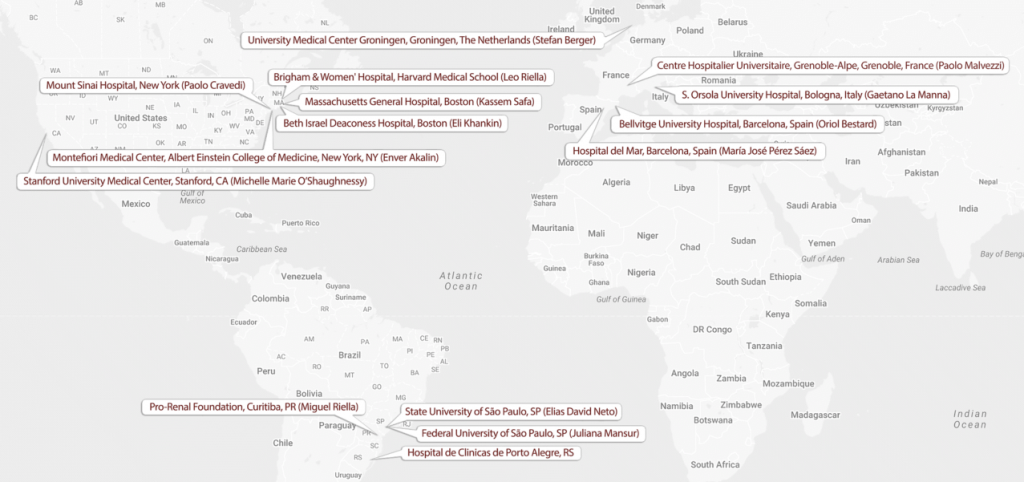BMC Nephrol. 2018
Authors:
Uffing A, Perez-Saez MJ, La Manna G, Comai G, Fischman C, Farouk S, Manfro RC, Bauer AC, Lichtenfels B, Mansur JB, Tedesco-Silva H, Kirsztajn GM, Manonelles A, Bestard O, Riella MC, Hokazono SR, Arias-Cabrales C, David-Neto E, Ventura CG, Akalin E, Mohammed O, Khankin EV, Safa K, Malvezzi P, O’Shaughnessy MM, Cheng XS, Cravedi P, Riella LV.
Abstract
BACKGROUND:
Long-term outcomes in kidney transplantation (KT) have not significantly improved during the past twenty years. Despite being a leading cause of graft failure, glomerular disease (GD) recurrence remains poorly understood, due to heterogeneity in disease pathogenesis and clinical presentation, reliance on histopathology to confirm disease recurrence, and the low incidence of individual GD subtypes. Large, international cohorts of patients with GD are urgently needed to better understand the disease pathophysiology, predictors of recurrence, and response to therapy.
METHODS:
The Post-TrANsplant GlOmerular Disease (TANGO) study is an observational, multicenter cohort study initiated in January 2017 that aims to: 1) characterize the natural history of GD after KT, 2) create a biorepository of saliva, blood, urine, stools and kidney tissue samples, and 3) establish a network of patients and centers to support novel therapeutic trials. The study includes 15 centers in America and Europe. Enrollment is open to patients with biopsy-proven GD prior to transplantation, including IgA nephropathy, membranous nephropathy, focal and segmental glomerulosclerosis, atypical hemolytic uremic syndrome, dense-deposit disease, C3 glomerulopathy, complement- and IgG-positive membranoproliferative glomerulonephritis or membranoproliferative glomerulonephritis type I-III (old classification). During phase 1, patient data will be collected in an online database. The biorepository (phase 2) will involve collection of samples from patients for identification of predictors of recurrence, biomarkers of disease activity or response to therapy, and novel pathogenic mechanisms. Finally, through phase 3, we will use our multicenter network of patients and centers to launch interventional studies.
DISCUSSION:
Most prior studies of post-transplant GD recurrence are single-center and retrospective, or rely upon registry data that frequently misclassify the cause of kidney disease. Systematically determining GD recurrence rates and predictors of clinical outcomes is essential to improving post-transplant outcomes. Furthermore, accurate molecular phenotyping and biomarker development will allow better understanding of individual GD pathogenesis, and potentially identify novel drug targets for GD in both native and transplanted kidneys. The TANGO study has the potential to tackle GD recurrence through a multicenter design and a comprehensive biorepository.
BMC Nephrol. 2018 Sep 12;19(1):229. doi: 10.1186/s12882-018-1025-z.
Figure: Participating centers in the TANGO Study (image adapted from Google Maps, 2017)

